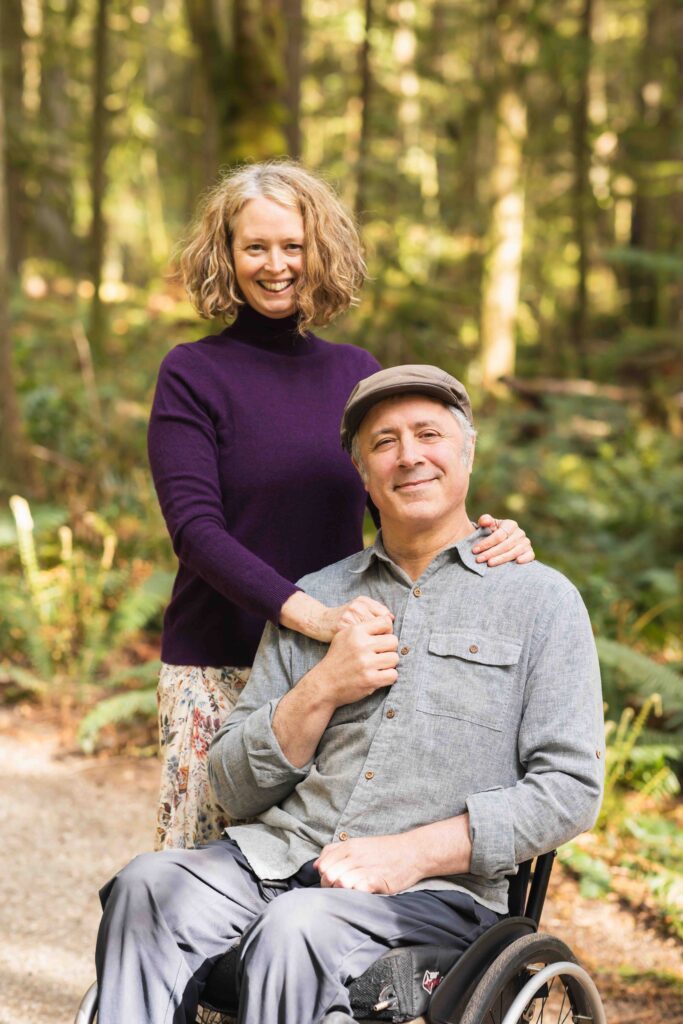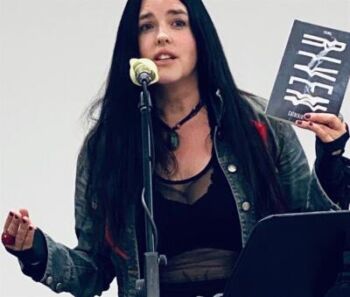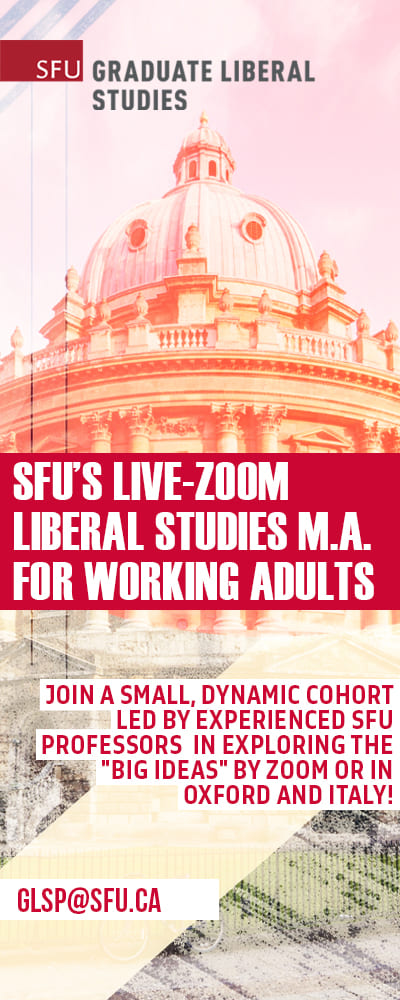Dealing with life-altering injury
The Pain Project: A Couple’s Story of Confronting Chronic Pain
by Kara Stanley with Simon Paradis
Vancouver: Greystone Books, 2024
$26.95 / 9781771648400
Reviewed by Catherine Owen
*

Recently, forgetting that I am aging, I spent a day tossing boxes around in my storage room, injured my shoulder and, over the course of the next few months experienced pain in a new way. The clinic doctor located bursitis, arthritis, and frozen shoulder via ultrasounds, but had nothing to offer me for my agony other than the admonition to take “Advils four times a day” if my medical didn’t cover Naproxen, and a cortisone shot that didn’t work (and doesn’t work for most, it seems). What was that saying of Einstein’s? “Insanity is doing the same thing over and over and expecting a different result.” One day I even ended up in the emergency room from the pain keeping me up at night. There I witnessed many patients being informed that, after they’d endured all the tests, from X-rays to bloodwork, there was nothing wrong with them. One Eastern European woman, brassy, weary, still wearing her cleaner’s uniform, moaned, “[b]ut what about the pain?” I saw the doctor shrug. According to the tenets of western medicine and its entanglements with Big Pharma, there was little else to offer other than yet more pain medications, whether they worked or didn’t or even worse, got patients hooked.
Over the last few years, we’ve seen even more of an upsurge in societal suffering caused by long Covid. My sister, who has struggled for three years now with symptoms ranging from exhaustion and weakness to extreme burning and needling pain, and who has gone from an active woman in her early 40s to someone often confined to a wheelchair from the torment, came immediately to my mind when I saw the title The Pain Project. She has needed to relentlessly self-educate through books, seminars, forums, and other means via which to better comprehend what is happening to her, a situation rendered even more challenging by the fact that it’s a relatively new set of symptoms for the medical world, complicating understanding, support, and treatment.
This essential tome is the wisest and most engagingly readable text on this topic I’ve personally encountered. Kara Stanley begins with the life-altering core narrative of her husband Simon’s construction accident that rendered him physically disabled, and draws from his personal and their collective experience of dealing with his chronic (and unexpectedly shocking) pain to create a conversation surrounding attitudes, prescriptions, technology, scholarship, and the day-to-day realities of combatting and accepting agony.
The story begins ten years after Simon’s accident in 2018 and ends in 2020, but the focus is on the year they spent intent on the whys, hows, and what-nows of his suffering in their Tackling Pain project. During this time, they explore a vast range of possible positionalities, treatments, and research to address the harsh continuance of pain. Each chapter is established as a dialogue between Kara (whom Simon often refers to, humorously, by her last name, Stanley) and Simon, one embedded in approaches to his often-inexplicable condition (how can limbs that don’t feel, feel pain? Talk about injustice!). From testing out the Curable app, to regular journaling, to trying another pointless nerve ablation, to attending a conference in England on academic discoveries, to working on Pilates exercises, and to Simon taking UDream with its compromised ingredients and its brief lifting of symptoms, the journey to relief offers no easy solutions (or any at all in a sense as pain is so very complex and individualized) nor prescriptive conclusions. Also, there are so many leftover questions as to why there aren’t more developed uses of VR to rewire pain responses or why there is so little research on the effect of anxiety on pain.

However, there is much delightful repartee between the couple as they cook or eat out (“kale coleslaw, cornbread, smoked wings, watermelon lemonade, almond cream tart”), walk/wheel in the forest with their dog Chico (which brings up the Japanese “practice of shinrin-yoku, or forest bathing”), shop at a flaky Vancouver dispensary for possible balms such as THC “anal suppositories,” or create a domestically less-stressful environment for a recording session with Simon’s band, Farm Team (“it’s wonderful to have the house suddenly filled with so much music and laughter…Of course, it might also end up being a setback. Simon will undoubtedly push the limits of his physical and mental stamina over the next few days and this increased exertion will certainly trigger escalating pain”). Only occasionally does it become a little cutesy (say when during a basketball game they dub each other, “Wheels McSwish and Stanley Buckets”) and thus less believable as a narrative technique (whether or not this nicknaming occurred), but mostly it’s tremendously effective, not only in conveying their particular caregiver/sufferer dynamic but also in allowing so much information to be articulated in appealing ways. Absorbing so much material on the history and management of pain could theoretically be a snoozer, but Stanley keeps the tone warm and the pace compelling.
The thread text of Simon’s music, from excerpts of his lyrics and song lists, to rehearsals to recording to his nerve-wrackingly sold-out performance near the end at the Cultch (I love knowing the slang for Vancouver locales!), truly reminds us of the whole person who was broken and yet who continues to create, regardless. The emphasis on our human “neuroplasticity” or the ability of the nervous system to alter its functions and responses following injury, ends up giving the most accurate approach to why the pain occurs, while offering hope for possible re-configurings of its pertinacity, if not resolutions. Amid the constant attempts to self-educate and seek solace, the couple’s frustrations leak through too, and Stanley can so honestly admit, “I hate our constant state of vulnerability. I hate how things that used to be easy are now difficult and things that were difficult often feel impossible.” They don’t hesitate to say “fuck” this or that to each other and their realness gives us all permission to acknowledge the tough paths so many of us pace within pain. “But this is our life,” Stanley concludes “and this is the work ahead.” At the end, a final chapter deals with the changes the first year of Covid created, which, for them, were more beneficial than not as stressors were reduced and Simon was finally able to quit opioids. While acknowledging the struggles others faced, Stanley still allows us all that surge of hope so necessary to sustaining human life, even if, or because it is, as Emily Dickinson wrote, that “thing with feathers.”
*

Catherine Owen was born and raised in Vancouver by an ex-nun and a truck driver. The oldest of five children, she began writing at three and published at eleven—a short story in a Catholic school’s writing contest chapbook. She gave public poetry readings in her teens; Exile Editions published her poetry collection on Egon Schiele in 1998. Since then, she’s released fifteen collections of poetry and prose, including essays, memoirs, short fiction, and children’s books. Her latest books are Riven and Locations of Grief. She also runs Marrow Reviews, the podcast Ms Lyric’s Poetry Outlaws, the YouTube channel The Reading Queen, and the performance series, 94th Street Trobairitz. She’s been on 12 cross-Canada tours, played bass in metal bands, worked in BC Film Props, and currently runs an editing business out of her 1905 house in Edmonton where she lives with four cats. [Editor’s note: Catherine Owen has also reviewed books by Sharon McCartney & Andrea Scott, Tom Wayman, Chris Walter, Andrea Warner, Aaron Chapman, and Emelia Symington-Fedy for The British Columbia Review.]
*
The British Columbia Review
Interim Editors, 2023-25: Trevor Marc Hughes (non-fiction), Brett Josef Grubisic (fiction)
Publisher: Richard Mackie
Formerly The Ormsby Review, The British Columbia Review is an on-line book review and journal service for BC writers and readers. The Advisory Board now consists of Jean Barman, Wade Davis, Robin Fisher, Barry Gough, Hugh Johnston, Kathy Mezei, Patricia Roy, Maria Tippett, and Graeme Wynn. Provincial Government Patron (since September 2018): Creative BC. Honorary Patron: Yosef Wosk. Scholarly Patron: SFU Graduate Liberal Studies. The British Columbia Review was founded in 2016 by Richard Mackie and Alan Twigg.
“Only connect.” – E.M. Forster






























